GALLUP NEWS SERVICE
PRINCETON, NJ -- Forty-two percent of Americans now approve of President George W. Bush's job performance, four points higher than the rating Gallup measured three weeks ago, in the Nov. 17-20 poll, and a point lower than the rating Gallup measured at the end of last week in the Dec. 5-8 poll. Compared with the November poll, Bush's ratings are also up slightly on the economy, Iraq, terrorism, and foreign affairs.
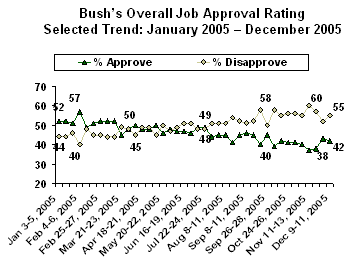
The increase in Bush's overall job approval is reinforced by comparing the average of two polls in November with two polls in December -- 37.8% vs. 42.9%, respectively. That average five-point difference is well outside the margin of error of the combined polls, showing that the increase, while small, is statistically significant.
The improved ratings come in the wake of a more active effort by Bush to defend his administration's Iraq policy. On Nov. 30, the president launched a series of four speeches, which were intended to highlight the importance of the upcoming Iraqi parliamentary elections. Since then, he has delivered two additional addresses, all making the case for a continued U.S. military presence in Iraq until "victory" is achieved.
The poll suggests that Bush's increase in ratings comes primarily among independents, who typically are more susceptible than strong partisans to being influenced by new information. Republicans and Democrats apparently are little swayed in their positive and negative views, respectively, of the president.
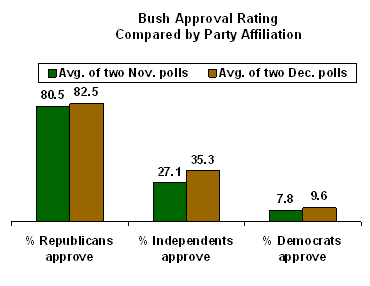
In the two December polls, 35.3% of independents approved of Bush's job performance, up from 27.1% in the two November polls -- an eight-point increase. By contrast, Republican approval increased by two points from November to December, and Democratic approval increased by just under two points.
On the economy, Bush's rating is up three percentage points since the Nov. 11-13 poll (37% to 40%); on Iraq up four points (35% to 39%); on terrorism up four points (48% to 52%); and on foreign affairs up five points (37% to 42%).
Other polls have also shown an increase in Bush's standing among the public, with some commentators suggesting the improvement is related not to Iraq but to the economy. The poll results here suggest perhaps an even broader interpretation -- that Bush's improvement may be related to his making a more aggressive defense of his administration, regardless of the specific issue. With slight to modest increases across the various issues noted above, it would appear that many Americans (mostly independents) have more positive views of the president overall, not just on the way he is handling the war in Iraq.
The year-long trends on each of the issues show that despite the current upward movement, there has been little long-term change in the public's position on Bush and the various issues. Bush's most positive ratings still come on his handling of terrorism, with a slight majority now approving of his performance on this issue, up from an essential tie in November, and about the same level it has been since August.
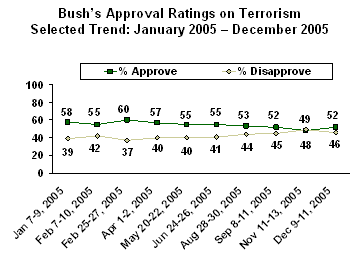
On Iraq, a clear majority continues to disapprove of Bush's performance, 59% to 39%, although not by the same margin as in mid-September. Still, the current rating is consistent with ratings taken this summer.
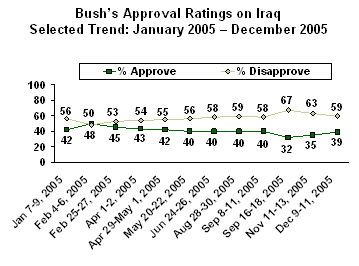
Bush's rating on the economy has fluctuated over the past year, but since the spring it has been more negative than positive. The current 58% disapproval to 40% approval is similar to ratings that go back to April.
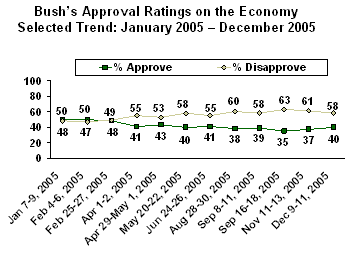
On foreign affairs, the same pattern prevails -- more people disapprove of Bush's performance than approve, but the ratio is not as bad now as it was in November and September. However, the current rating is still worse than Bush's ratings from January through April.
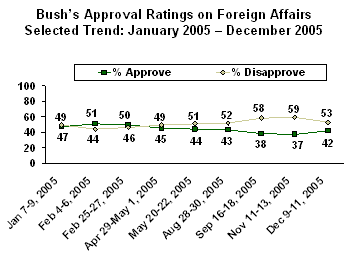
Polarized Public
The poll also shows that the public is highly polarized in its evaluation of the president. One type of polarization is measured by calculating the difference between the views of Republicans and Democrats. While 81% of Republicans currently approve of Bush's job performance, just 10% of Democrats approve. This type of polarization has been noted in previous articles on the Gallup Web site.
Another type of polarization is reflected in the intensity of opinion people express on the issue. While people who approve of the president divide about equally between those who "strongly" approve and those who "moderately" approve, the people who "strongly" disapprove outnumber those who "moderately" disapprove by more than 3 to 1.
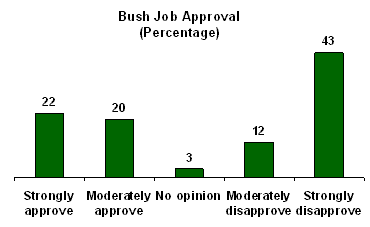
These results show that about twice as many people strongly disapprove of Bush's performance (43%) as strongly approve (22%).
Survey Methods
Results are based on telephone interviews with 1,003 national adults, aged 18 and older, conducted Dec. 9-11, 2005. For results based on the total sample of national adults, one can say with 95% confidence that the maximum margin of sampling error is ±3 percentage points.
In addition to sampling error, question wording and practical difficulties in conducting surveys can introduce error or bias into the findings of public opinion polls.